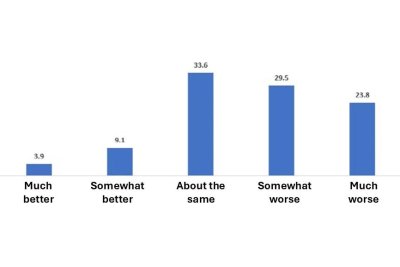More than 8 in 10 foreigners show favorable view of S. Korea: survey

Foreign tourists pose for a photo in the Myeongdong area of Seoul on Tuesday. According to a survey released Tuesday by the Ministry of Culture, Sports and Tourism, 82.3% of foreigners expressed a favorable opinion of South Korea. Photo by Yonhap
More than eight in 10 foreigners hold a favorable view of South Korea, the highest level since the annual survey began seven years ago, a government report showed Tuesday.
According to the 2025 survey on South Korea’s national image conducted by the Ministry of Culture, Sports and Tourism, 82.3 percent of respondents said they viewed South Korea positively, up 3.3 percentage points from a year earlier. The figure marks the highest since the survey was launched in 2018.
By country, the United Arab Emirates recorded the most positive sentiment at 94.8 percent, followed by Egypt (94 percent), the Philippines (91.4 percent), Turkey (90.2 percent), India (89 percent) and South Africa (88.8 percent).
Perceptions improved sharply in Britain and Thailand, which rose 9.2 and 9.4 percentage points to 87.4 percent and 86.2 percent, respectively. Britain was the only European country to show above-average favorability toward Korea.
Even in countries where views were traditionally lukewarm, such as China and Japan, positive opinions gained ground. China’s score climbed 3.6 percentage points to 62.8 percent, while Japan rose 5.4 points to 42.2 percent — more than double its 2018 level of 20 percent.
Cultural content, such as K-pop, dramas and films, was cited as the biggest factor influencing positive perceptions, mentioned by 45.2 percent of respondents. The impact was strongest in Asian countries, including the Philippines, Japan, Indonesia and Vietnam. Modern lifestyle, products and brands, and the economy also contributed to Korea’s appeal.
The survey found that video platforms were the most common source of exposure to Korea at 64.4 percent, followed by social networks (56.6 percent), websites (46.7 percent) and broadcast media (32.8 percent).
In-depth interviews with international students and foreign correspondents in South Korea highlighted positive assessments of the “resilience” of the country’s democratic system, demonstrated by the process of its recovering from the aftermath of former President Yoon Suk Yeol’s martial law fiasco, which occurred nearly a year before the interviews.
The survey was conducted on 13,000 people aged 16 and older in 26 countries, including South Korea, from Oct. 1-31 last year. Korean respondents were excluded from the results to gauge the country’s favorability among foreigners.
Copyright (c) Yonhap News Agency prohibits its content from being redistributed or reprinted without consent, and forbids the content from being learned and used by artificial intelligence systems.





